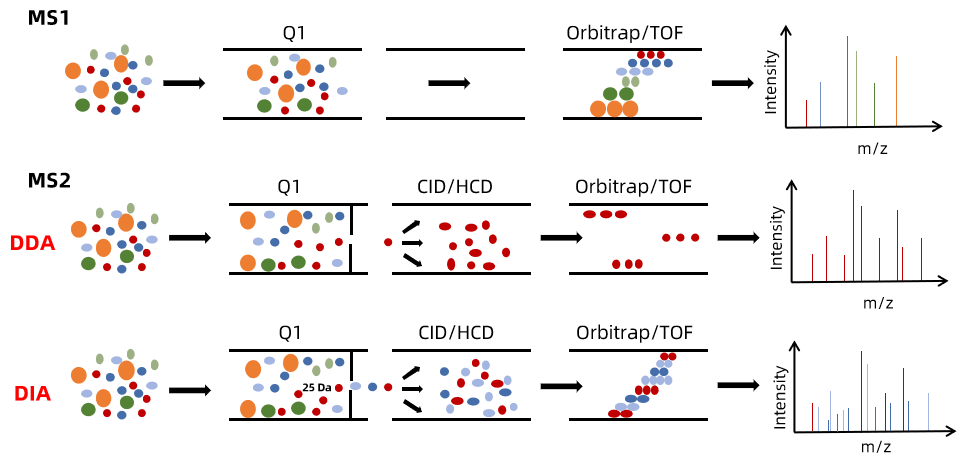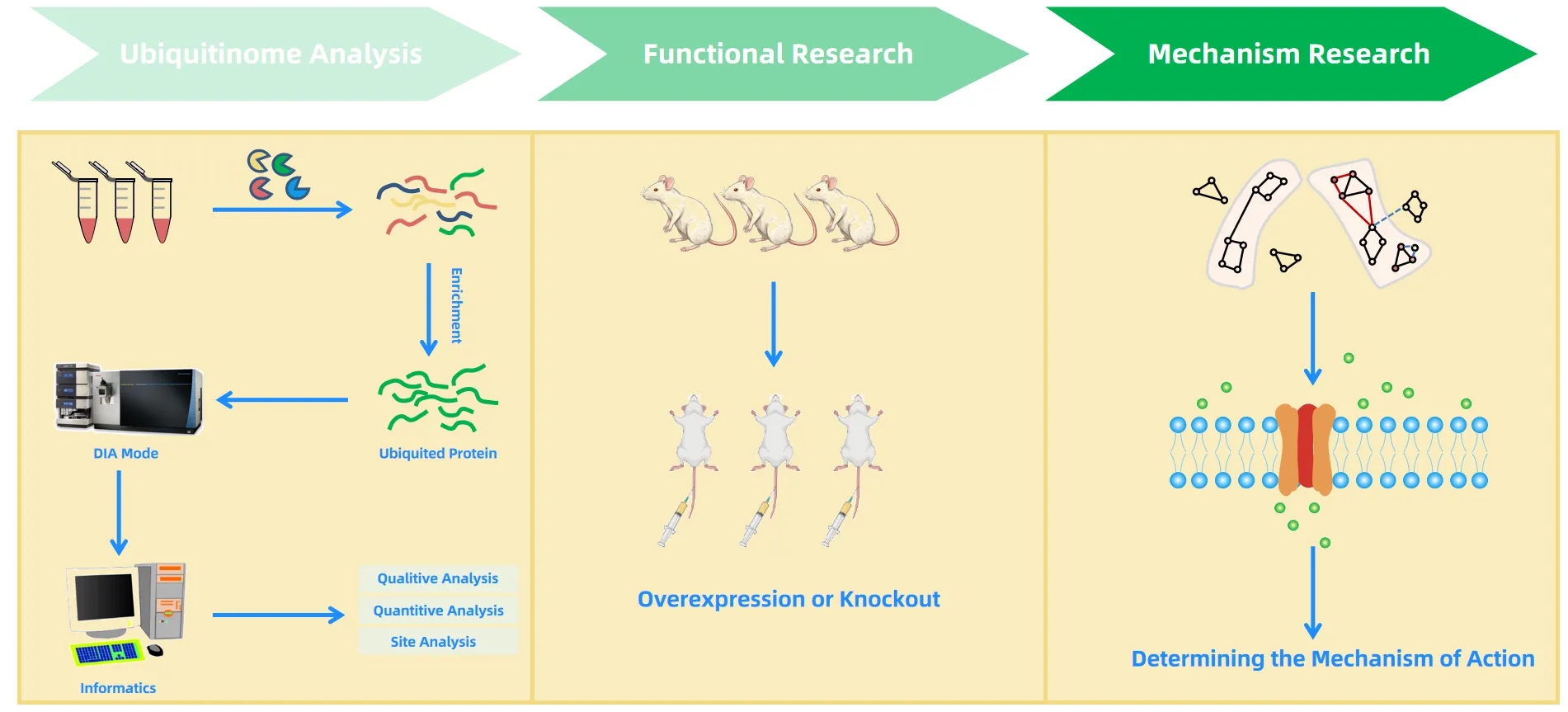DIA-MS Ubiquitinome Analysis Service
DIA-MS Ubiquitinome Analysis Service at MtoZ Biolabs delivers large-scale, quantitative, and reproducible profiling of ubiquitination events across diverse biological systems. By integrating data-independent acquisition mass spectrometry (DIA-MS) with selective enrichment strategies, this service achieves precise detection of site-specific ubiquitination and reveals protein regulation and signaling dynamics with high accuracy.
Ubiquitination is a pivotal post-translational modification (PTM) that regulates protein degradation, DNA repair, immune responses, and cellular signaling. Dysregulation of the ubiquitin–proteasome system (UPS) is closely associated with cancer, neurodegenerative disorders, and autoimmune diseases. Traditional methods such as Western blotting or data-dependent acquisition (DDA-MS) often fall short in sensitivity and reproducibility, particularly for low-abundance or transient ubiquitination events. DIA-MS overcomes these challenges by providing consistent proteome-wide coverage, accurate quantitation, and fewer missing values, making it a powerful solution for both basic and translational ubiquitinome research.
Technical Principles
DIA-MS Ubiquitinome Analysis Service combines selective peptide enrichment with systematic mass spectrometric acquisition. Following proteolytic digestion, ubiquitinated lysine residues retain a di-glycine (K-ε-GG) remnant that serves as a molecular marker. These modified peptides are enriched with high-affinity antibodies to ensure selective recovery from complex proteomes.
Unlike DDA-MS, which randomly selects precursor ions and frequently produces missing values, DIA-MS systematically fragments all ions within predefined m/z windows. This approach guarantees consistent detection, accurate site localization, and robust quantification of ubiquitination dynamics. As shown in the following figure, DIA provides broader and more reproducible coverage compared with DDA, particularly for low-abundance ubiquitinated peptides.

Figure 1. Comparison of Acquisition Strategies
Services at MtoZ Biolabs
At MtoZ Biolabs, our DIA-MS Ubiquitinome Analysis Service follows a rigorous and standardized workflow to ensure comprehensive, site-specific, and reproducible ubiquitinome profiling.
1. Sample Preparation
Proteins are extracted from cells, tissues, or fluids and digested into peptides, generating ubiquitin-modified peptide fragments.
2. Ubiquitinated Peptide Enrichment
K-ε-GG remnant peptides are selectively enriched using high-specificity antibodies, ensuring sensitive detection of ubiquitination sites from complex backgrounds.
3. DIA-MS Acquisition
Enriched peptides are analyzed on high-resolution Orbitrap and timsTOF Pro platforms in DIA mode, which systematically fragments all precursor ions for unbiased and reproducible quantification.
4. Bioinformatics and Data Interpretation
Advanced informatics pipelines deliver qualitative identification, quantitative comparisons, and precise site-level analysis, coupled with pathway enrichment and network insights.
In addition to ubiquitinome profiling, MtoZ Biolabs also supports downstream functional validation through overexpression or knockout models, and mechanism research aimed at clarifying the role of ubiquitination in signaling and disease. These complementary services allow researchers to move seamlessly from large-scale discovery to mechanistic studies.

Figure 2. The Workflow of DIA-MS Ubiquitinome Analysis
Why Choose MtoZ Biolabs?
✔ High Sensitivity: Optimized enrichment combined with DIA-MS enables detection of low-abundance ubiquitination sites.
✔ Reproducible Quantification: DIA ensures consistent coverage with fewer missing values than DDA-MS.
✔ Comprehensive Workflow: From peptide enrichment to advanced bioinformatics analysis.
✔ Flexible Sample Types: Compatible with cells, tissues, serum, plasma, and microbial samples.
✔ Scalable Solutions: Suitable for targeted projects or large cohort studies.
✔ One-Time-Charge: Our pricing is transparent, no hidden fees or additional costs.
Sample Submission Suggestions
For optimal results in DIA-MS Ubiquitinome Analysis Service, we recommend the following sample amounts:

Note: Samples should be snap-frozen in liquid nitrogen and shipped on dry ice. Our technical team will provide detailed guidance on sample preparation to ensure compatibility with DIA-MS analysis.
Applications
Our DIA-MS Ubiquitinome Analysis Service empowers researchers to address key scientific and translational questions:
Disease Mechanism Research: Quantifying ubiquitination alterations in cancers, neurodegenerative diseases, and autoimmune disorders to reveal disease-specific pathways.
Drug Development and Precision Medicine: Evaluating ubiquitination dynamics under proteasome inhibitors, PROTACs, or molecular glues to support mechanism-of-action studies and biomarker discovery.
Agricultural and Microbial Studies: Characterizing ubiquitin-related regulation in plants and microorganisms to uncover stress response and adaptive mechanisms.
Systems Biology: Integrating ubiquitinome data with proteomics, phosphoproteomics, and acetylomics to map regulatory crosstalk across PTMs.
What Could be Included in the Report?
1. Experimental Design & Sample Metadata
2. Enrichment Strategy, Antibodies & Methods
3. LC–MS/MS Acquisition & Quality Control
4. Quantitative Data Processing & Normalization
5. Bioinformatics Interpretation
6. Deliverables & Raw/Processed Data
MtoZ Biolabs leverages advanced DIA-MS technology to deliver comprehensive and reproducible ubiquitinome profiling. By overcoming the undersampling limitations of DDA-MS, our service ensures data completeness and reliable quantification. In addition to ubiquitination, we also provide broad post-translational modification (PTM) proteomics solutions, enabling researchers to explore the full regulatory landscape of proteins.
Contact us today to learn how our DIA-MS Ubiquitinome Analysis Service can accelerate your research.







